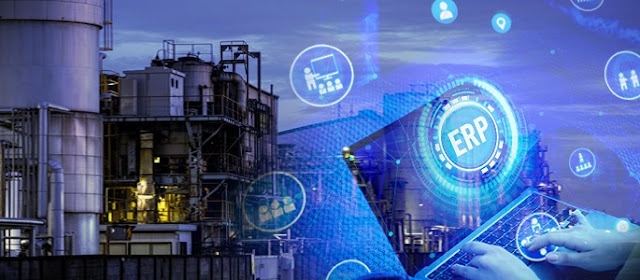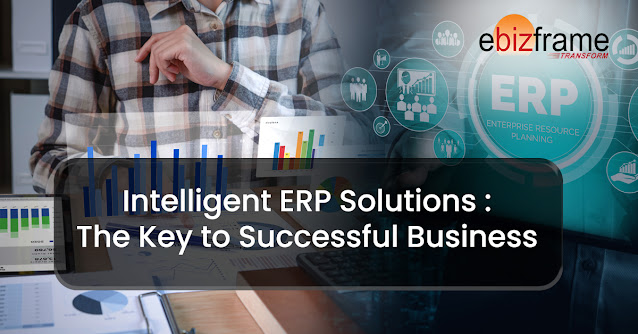The global chemical industry is facing an urgent need for sustainability. As environmental concerns rise, chemical companies are challenged to reduce their ecological footprint and adopt more sustainable practices. This endeavour calls for a comprehensive and multifaceted approach, and the emergence of Intelligent Enterprise Resource Planning (ERP) systems offers a promising solution. Intelligent ERP for Chemical Industry harnesses the power to help chemical manufacturers navigate the path to sustainability, transform their operations, and minimize their environmental impact.
Embracing Integrated ERP for Chemical Industry Implementation
One of the fundamental steps towards achieving sustainability in the chemical industry is the adoption of a comprehensive
ERP for Chemical Industry. Such a system oversees the entire chemical production process, from raw material procurement to product distribution, providing a holistic view of operations.
Chemical ERP enables companies to identify and eliminate inefficiencies, waste, and emissions by integrating various modules such as supply chain management, inventory control, and production planning. This integrated approach lays the groundwork for a more sustainable future.
Related Blogs :
Data-Driven Decision Making
Intelligent ERP systems empower chemical companies to make data-driven decisions that drive sustainability. ERP for Chemical Industry collect and analyze data on energy consumption, water usage, hazardous waste generation, and other critical metrics, providing insights necessary for setting improvement targets, monitoring progress, and making informed decisions. With access to real-time data, chemical manufacturers can identify areas of improvement, optimize resource utilization, and reduce their environmental impact.
Supply Chain Optimization
The intricate supply chains of the chemical industry play a significant role in its environmental impact. Intelligent ERP for Chemical Industry bring supply chain optimization to the forefront, identifying and addressing bottlenecks, reducing transportation emissions, and enhancing resource utilization efficiency. ERP Software Systems enables chemical companies to minimize waste, reduce carbon emissions, and create a more sustainable supply chain by streamlining logistics, improving demand forecasting, and optimizing inventory management.
Regulatory Compliance Management
Compliance with environmental regulations is paramount for chemical companies seeking to operate sustainably. Intelligent ERP for Chemical Industry streamline the process of regulatory compliance tracking and management, ensuring that operations adhere to the latest environmental standards. ERP Software Systems minimizes the risk of penalties and legal disputes by automating compliance processes, allowing chemical manufacturers to focus on sustainable practices and minimize their environmental footprint.
Stakeholder Engagement
Sustainability is not a top-down mandate; it requires the active engagement of all stakeholders. Intelligent ERP Software Systems facilitate effective communication and collaboration, fostering a culture of sustainability within the company. ERP for Chemical Industry empowers employees to contribute to the overall sustainability goals by providing a centralized platform for sharing information, tracking progress, and soliciting feedback. This collaborative approach enhances employee engagement, fosters innovation, and creates a shared sense of responsibility towards sustainability.
Technological Advancements Propelling Sustainability
The integration of advanced technologies within Intelligent ERP Software Systems further propels sustainability in the chemical industry. These technologies enable real-time monitoring and control of production processes, empowering chemical companies to identify and rectify issues promptly, minimizing waste, emissions, and downtime. Predictive analytics, another powerful tool embedded in Intelligent ERP software, allows chemical manufacturers to anticipate potential problems and take preventive action. ERP Software Systems can predict equipment failures, resource shortages, and environmental risks by analysing historical data and identifying patterns, enabling timely interventions and mitigating their impact.
Closed-Loop Recycling
Closed-loop recycling is a hallmark of sustainable manufacturing practices. It involves the recovery and reuse of materials and waste products, reducing reliance on virgin materials and minimizing the environmental impact of production processes. Intelligent ERP for Chemical Industry play a crucial role in managing and optimizing closed-loop recycling initiatives. Intelligent ERP Software Systems enables chemical companies to achieve higher levels of sustainability and reduce their ecological footprint by tracking the flow of materials, monitoring recycling processes, and ensuring efficient resource utilization.
Renewable Energy Integration
The transition towards renewable energy sources is essential for decarbonizing the chemical industry.
Intelligent ERP Software Systems facilitate the integration of renewable energy into production processes, providing real-time data on energy consumption, generation, and grid availability.
Chemical companies can maximize renewable energy utilization, reduce their reliance on fossil fuels, and significantly reduce their carbon footprint by leveraging this data. This integration of renewable energy sources not only contributes to sustainability but also provides long-term cost savings and energy independence.
Success Stories: Paving the Way for a Sustainable Future
Several chemical companies have already embraced Intelligent ERP for Chemical Industry and achieved impressive sustainability outcomes. For example, a leading African chemical company implemented an Intelligent ERP system to track and optimize energy consumption, resulting in a remarkable 10% reduction in energy usage since implementation.
Similarly, a multinational chemical corporation operating in Africa leveraged an Intelligent ERP system to optimize its supply chain, leading to a 5% reduction in transportation costs and associated emissions.
An Indian multinational chemical corporation utilized a Chemical ERP Software Systems to ensure meticulous environmental compliance, resulting in a 15% reduction in emissions. These success stories demonstrate the effectiveness of Intelligent ERP systems in enabling chemical companies to adhere to environmental regulations, minimize waste, and reduce their environmental footprint.
Conclusion: A Beacon of Hope for a Sustainable Future
Intelligent ERP systems have revolutionized the chemical industry by providing a roadmap for sustainability. ERP software empowers chemical companies to navigate the path to sustainability by integrating various modules, harnessing the power of data analytics, optimizing supply chains, ensuring regulatory compliance, fostering stakeholder engagement, and leveraging advanced technologies. These systems are not mere technological advancements; they are catalysts for change, enabling chemical manufacturers to make informed decisions, optimize operations, and minimize their environmental impact. As technology continues to evolve, Intelligent ERP for Chemical Industry will play an even more pivotal role in shaping the industry and paving the way for a sustainable future. These innovative tools empower the chemical industry to confidently navigate the path to sustainability, ensuring a cleaner, healthier, and more environmentally responsible future for generations to come.
To embark on this transformative journey towards a sustainable future, seize the power of Intelligent ERP with ebizframe. Contact us at marketing@ebizframe.com or visit www.ebizframe.com to explore how our cutting-edge solutions can be the beacon guiding your chemical industry towards enhanced efficiency, compliance, and environmental responsibility. Together, let's build a future that is not just sustainable but thriving.









Comments
Post a Comment